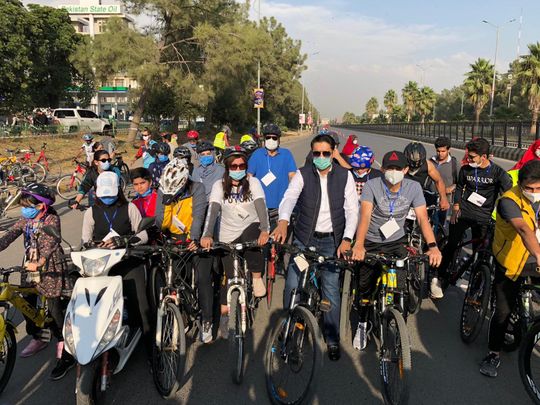
Islamabad: Men, women and children rediscovered the love of cycling on a spectacular Sunday afternoon in Islamabad as they reclaimed road space from cars. The biking activity, planned on the first Sunday of every month, aims to transform Pakistan’s capital city into a bicycle-friendly city to give more street space to cyclists and pedestrians.
A large number of people joined the ‘Cycling Sunday Islamabad’ event and cycled on the city’s main arterial road, Jinnah Avenue to D-chowk, strictly following the COVID-19 rules with their masks on, while enjoying the greenery, fine weather and car-free road.
Healthy and safe mode of urban mobility
Islamabad Deputy Commissioner (DC), Hamza Shafqaat, and Minister of Inter Provincial Coordination, Dr Fahmida Mirza, also joined them to encourage more people to cycle as the activity aligns with the prime minister’s Clean and Green Pakistan initiative. “This event gives a clear message that the roads in Islamabad are safe for bicycles” said Hamza Shafqaat, adding that the city administration is committed to ensure “dedicated cycling tracks.”
Besides offering a healthy and safe travel option, it is also “essential for mitigating climate change that cycling is promoted as an urban mobility option”, Dr Mirza said. The event was jointly organized by Urban Innovation and Islamabad Capital Territory (ICT) Administration in partnership with Urban Platform of UNDP, Islamabad Traffic Police, National Incubation Center, Islamabad Cycling Association and others.
Dedicated cycling lanes
Naveed Iftikhar, a policy advisor who believes that cycling should be considered an equal mode of transport, is the one who encouraged Islamabad residents to join the weekend biking event. “We aim to promote this affordable and sustainable mode of transport all over Pakistan as its benefits range from individual to social, economic and environmental,” claims Naveed. “Cycling is a fun way to stay healthy and an activity that helps reduce traffic, air pollution and improve accessibility.”
With frequent events, the Islamabad cyclists aspire to educate and inspire more Pakistanis to take up bicycling while advocating for dedicated bike lanes. The first step should be “to dedicate at least 20km car-free road network in Islamabad for the monthly cycling activity. In the second phase, dedicated lanes for schools and offices can be launched” the organisers insisted.
Healthy urban mobility option
The event helped many realise that cycling is not just a sport but also a healthy urban mobility option. “Encouraging cycling as a mode of transport will also promote women’s mobility and empowerment,” said a participant and professional cyclist, Sundas Shahid.
Cycling in a car-centric city
In Pakistan, cycling is not considered a viable transport option and this mindset is what the organisers are endeavoring to change. Naveed Iftikhar is deeply concerned about the country’s car-centric urban planning. “We need to think public transport and must integrate healthy and sustainable options” like walking, cycling, and mass transit “to make our cities livable”, to improve quality of life and mitigate the effects of climate change.
The country is taking baby step towards embracing a healthy and environmentally friendly lifestyle as Pakistan’s first electric bike sharing service was launched last month in Islamabad with a mission to transform the urban transportation.








